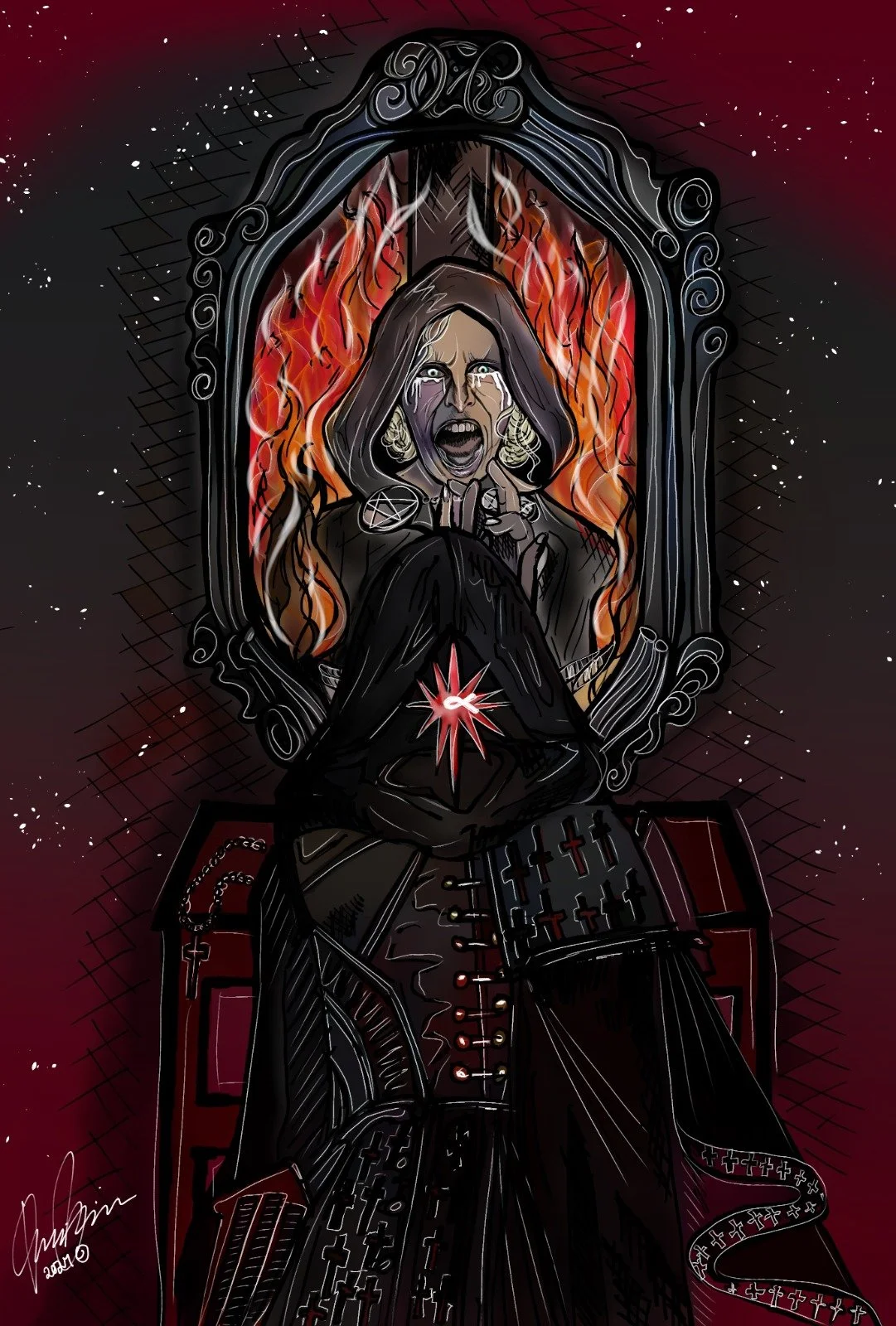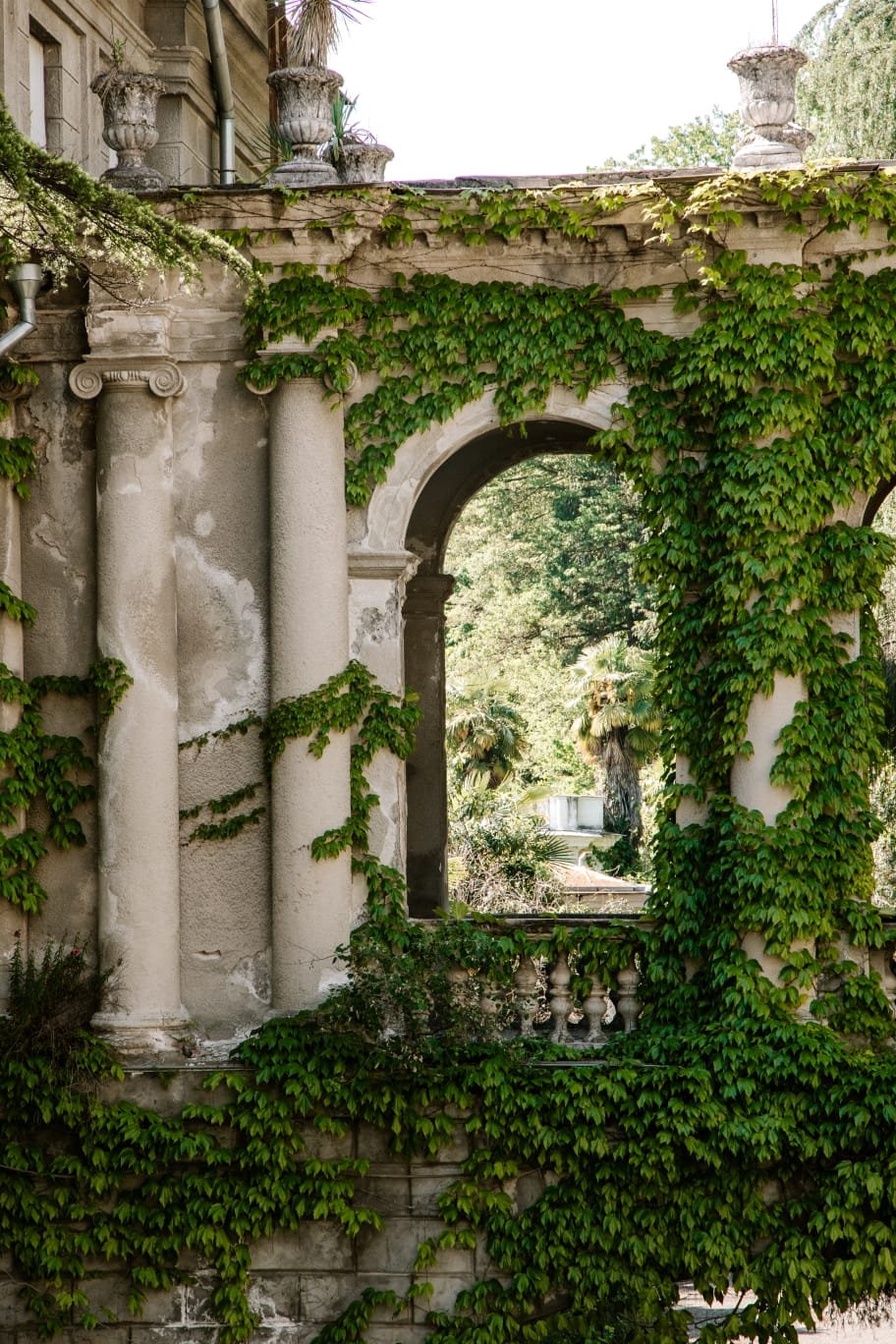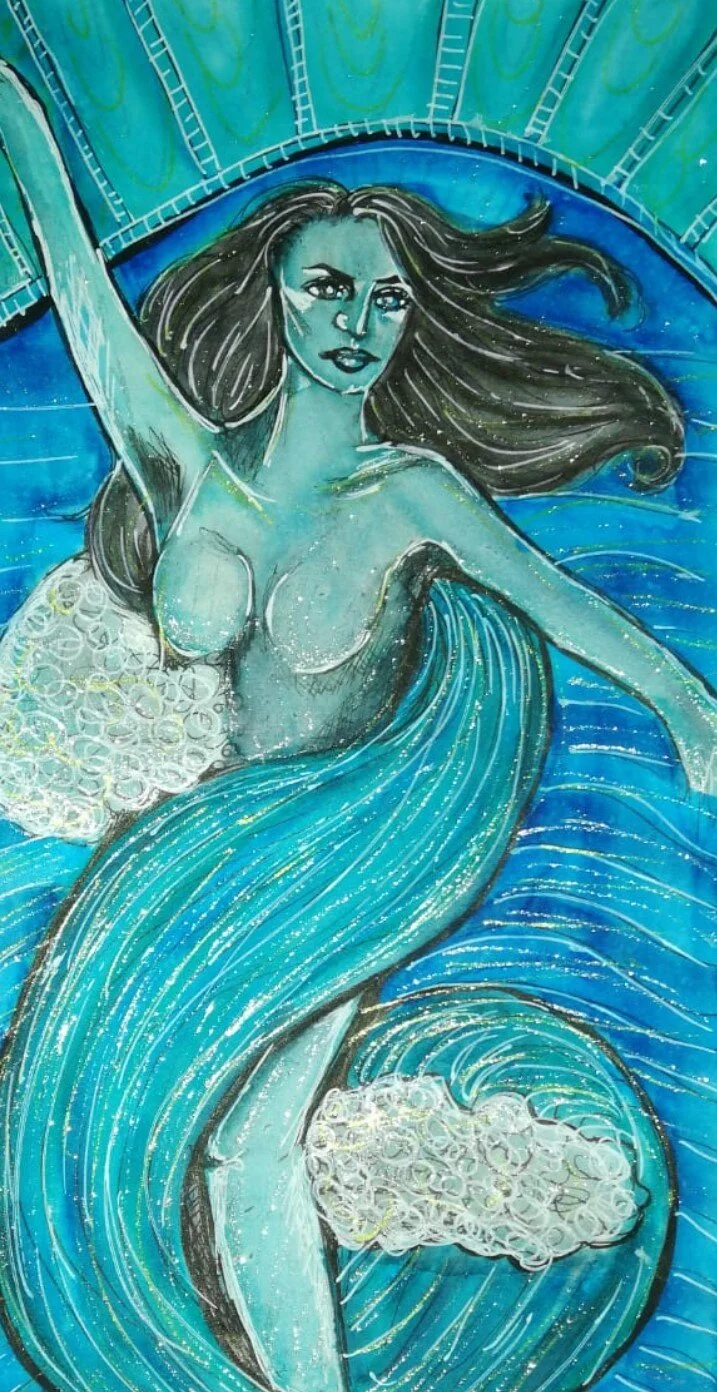The Witch Hunter
Judgment Day begins as a misty, bitter morning on the open road.
It ends at the stake.
The village folk have clustered around the scene, drawn in by morbid fascination and the temptation of fiery warmth to break the late autumn chill. A fine sheen of frost covers the meagre fields on the outskirts; the now-defunct vegetable-gardens; the eyelashes of the condemned, tied to the hastily raised stakes. The air itself trembles, shivers - in fear, anticipation, perhaps just in the chill. The feeling seeps into the crowd, thrumming with mixed feelings as they watch the Witch Hunters pile additional kindling around the feet of the sinners, an additional measure against the adverse conditions.
Unwilling to rely on the villagers to condemn their own, the Hunters themselves place the finishing touches on the scene, black cloaks fluttering in the wind, a perpetual mourning garb for their bleak line of work. A morbid sight, yet a necessary one. God’s work must be done, even if one ends up hailed as the Devil himself by the damned and their loved ones. Journeying from one village to another, routing out the sinners, their own heavenly redemption on the line, the Hunt rides forth. A cycle of death and redemption, the ouroboros, eating its own tail until the Hunt one day destroys itself and rebuilds the faith.
Among the cloaked figures, a woman throws kindling at the feet of an old crone tied to the stake. A faceless Witch-Hunter, she averts her eyes from the accusatory glares, soundlessly delivers the final rites. The crone spits in her face as she recites the Lord’s Prayer. The Witch-Hunter doesn’t flinch. It’s hardly the first time. She finishes the prayer, praying for even the most stubborn soul to find peace. Even if she goes in violence, the Hunt ensures the lost will find redemption in Heaven. Whether a witch or not, there is a peace in judgment, and a chance for mercy should God be as good as the Book finds him.
The girl tied to the other side is crying, a contrast to the furiously silent crone, mouth stitched shut by determination. Tears stream down her freckled cheeks, stuttered breaths escaping in puffs of white smoke. The Witch-Hunter saw to this one herself, examined the deathly pale skin until she found a mark, a wine-red splash against her hip. A contract with the devil, signed into the skin with wilful determination, a bride of the Devil donning her veil. Enough reason to sign her death warrant within the Hunt. They told the Witch-Hunter the girl was a dreamer, just wilful enough to shy convention, just liberated enough to be tempted. Fruit just ripe for the picking, and the Devil’s claws are long.
The girl’s lips tremble as the Witch-Hunter prays for her soul in worn syllables. Her eyes beg for something, but all words have been stolen by the panic, the tears, the cold. The only sound she makes is a choked whisper, a single “please”, a cry for something the Witch-Hunter can’t decipher. Refuses to decipher, even if she could. It’s easier to refrain from soft words and gestures than to force them out for those doomed in a matter of minutes. She has no comfort to offer, only prayers. A vague promise of something beyond the fires of judgment, of divine forgiveness.
Tears slip past the girl’s cheeks and into the kindling. The Witch-Hunter doubts it will affect the flames. An inconsequential action where the die has already been cast.
The rites now performed, the Witch-Hunter steps down, careful not to disturb the structures in place. Their job is a rushed one, a mad dash across the country to save souls with heavenly fire, not giving them enough time for proper construction. As long as they serve their purpose, hopefully never to be needed again. They will have to suffice for tonight. The two women tied to the stake are silent in their own ways, eyes clouded with anger and fear. The Witch-Hunter turns her gaze away. Her judgment has been cast alongside the Hunt, there’s no reason to disagree or bother herself with anything to the contrary. The condemned have all been marked, signed by the Devil’s handwriting.
The second stake is almost done as well, one more lost soul tied to it. Based on the growing bruise on the Hunter’s face as he joins the line of his pious colleagues, this one had put up a fight. The Witch-Hunter doesn’t blame them: despair in the face of one’s mortality is a unifying trait of humanity, no matter how inevitable or pointless it may seem. She observes the figure, now slumped over and breathing heavily in abject despair, and feels grateful for not having to take them on. Righteous anger is a strong repellent to a Hunter, be it from a conviction of one’s innocence or fury at being judged. She finds it taxing, the allegations burning her ears and chest for the rest of the day, until the night soothes it away.
In front of the stakes, the leader of the Hunt prepares his sermon, Hammer in his hands like a direct lifeline extended from heaven. Today he plays the role of judge, jury and executioner, equal to God himself in the eyes of the villagers. He is the worst kind of leader to the condemned village folk, a man who believes in his cause. An ascetic who’s blind to bribes, temptation, soft flesh, and fine jewels. His eyes only seek sin, his hands only for ways to purify it. The ideal man only for those fully aligned with him, a tireless beast to all others. It is both a blessing and a curse to let him be born into the exact circumstances in which to flourish.
The Witch-Hunter stands in the line of near-identical Hunters, hands clasped in loose prayer, hood pulled low over her head. It’s a strange phenomenon, how garb, posture and expression can reduce such diverse things as people to hollow copies of one another, in line at the execution grounds like starved crows perched in the tree, ready to pluck their charred morsels of meat from still-white bones.
The sun glows a dimming orange in the lowlands’ skyline, drawing its last breath before plunging the land into darkness. It’s nearly time for the execution, now only the public condemnation remains, the cries of devil-worship, of consorting with demons, casting evil eyes unto the country and bringing plague and misery where they land. Prosecution against those already judged.
The Witch-Hunter stands mutely as the allegations are read to the villagers. She doesn’t need to raise her voice or eyes to see the procession play out. The same tragedy each time, merely played on a slightly different stage with a new, captivated, and terrified audience.
This time, the villagers are calm, morose yet resolute. No child wails for its mother, no wife for her husband. There are no voices to hurl curses and allegations, cries of damnation and demands for divine punishment. The Hunt has ventured too far north to face such raw emotions. In a world where everyday life is a battle for survival in the unforgiving soil, a grim acceptance takes hold in matters of faith. The Witch-Hunter can respect that. In the large scale of things, a human life is meant to be a firefly flashing in the night, the antechamber to eternity. The only option is to embrace this dream or face the brutal senselessness of life and lose yourself between the millions of meaningless spaces. It’s easier to pick a god and pray.
The figures on the stake have begun to droop from despair and exhaustion alike, the chill of winter and death settling into their bones. The Witch-Hunter exhales a plume of steam and wonders whether the girl’s tears have frozen on her face, or whether she ran out of them before it got cold enough. She shakes her head to clear out the thought, it’s not her place to think about it. The girl cast her lot when she pledged herself to witchcraft. The Witch-Hunter has no part or parcel in her final judgment.
By now, it’s easy to remain stoic as the Hunters light their torches and throw them into the dry kindling. The Witch-Hunter casts hers into the stake she helped prepare and stares on as the flames begin to hungrily spread towards the women tied to it. The ravenous burn is a familiar sight and feeling by now. The scent may vary, but the sight of fire itself is remarkably similar each time.
Then again, many sights considered unfit for gentle, human eyes, become habitual to the Hunt.
In the end, the villages begin to blur into one. The faces and features combine into a single expression of despair, voices into monotonous shrieks and proclamations of innocence. Stripped skin and clothes into pinpoints of moles, scars, witch-marks, brands of the devil. The witches lose their individuality, only a cloak of persecution remains for them, shapeless forms under the weight of their sins, a uniform of their own to counterbalance the Hunters.
The Witch-Hunter has seen enough burnings to know what to expect.
Some, few and far between, burn in silence. They bite their lips, choke on their screams but refuse to yield, to show weakness in the face of condemnation. The ones who equate suffering to an admission of guilt. They burn as soundlessly as they claim to be sinless, stubbornly clinging to a ghost of dignity. They are the smallest in numbers, both old and young, some laced with the confidence of youth, some with the unwavering determination that comes with age. Assured of their virtue.
The old crone does not scream, perhaps out of pride, perhaps because her aged lungs are already choking with smoke.
Most of the condemned, however, scream. At their fellow villagers, their mothers, fathers, God himself to pardon them from their fate, the Devil to bargain with. The Witch-Hunter has yet to see either of them answer.
Perhaps even God cannot reverse the flames of Hell licking at the feet of the innocent and guilty alike.
The sole figure on the second stake screams for a name the Witch-Hunter doesn’t recognise. There’s a choked sound in the audience, but no further noise is made. Self-preservation runs strong, and no one wants to be known for consorting with the witch.
Even more are reduced to wordless screams in the face of agony, their only protest being the baleful glances thrown at the Hunt if they have the mind for it, wordless pleas at their families who turn away. In disgust, fear, in order to conceal their expressions. They lost their kin the moment the Devil declared his hold on them. What burns is merely a husk.
The girl screams.
Amidst the screams, the flames, the Witch-Hunter stands unmoving in line beside the pyre. The fire burns in her eyes, the cloying smoke in her nostrils. The taste of rusted blood fills her mouth, teeth digging into the inside of her cheek as the day turns into night and the chill sneaks down her neck. Yet she does not move, refuses to look away from the righteousness she propagates.
She watches unwaveringly as the sinners burn, remorseless and composed, a member of the very Hunt that persecutes her kin. Watches the careless, innocent and naïve burn for her sins, for the brand on her breast that burns like hot coals at every pyre. Perhaps it’s a reminder, an attempt to ignite guilt in bones where there is none.
Desperation knows no bonds, only survival. And the Witch-Hunter survives.
For is there no better disguise for the prey than the skin of the hunter?





